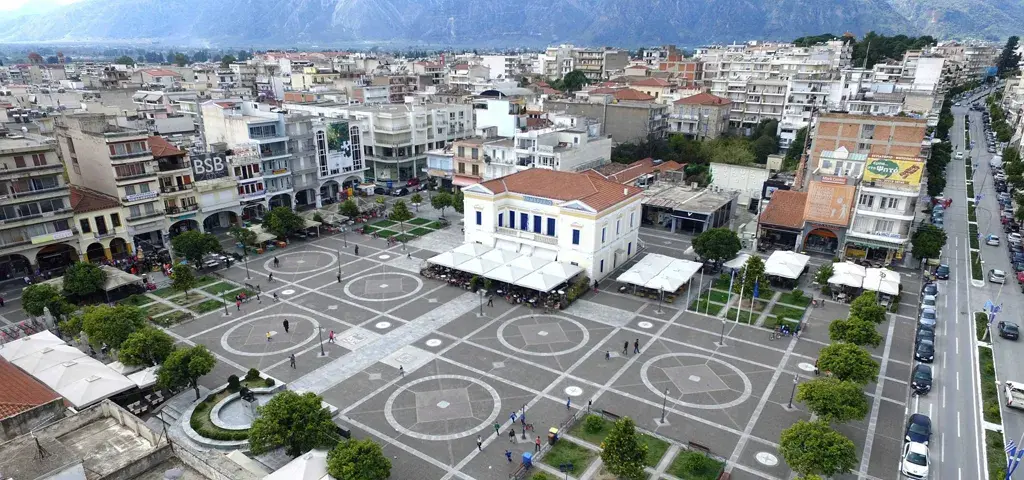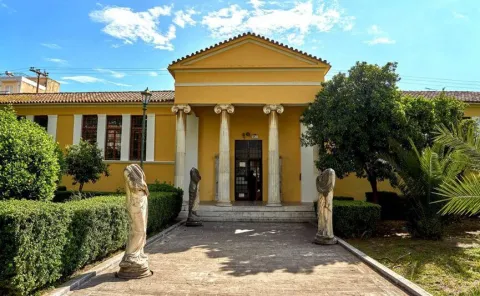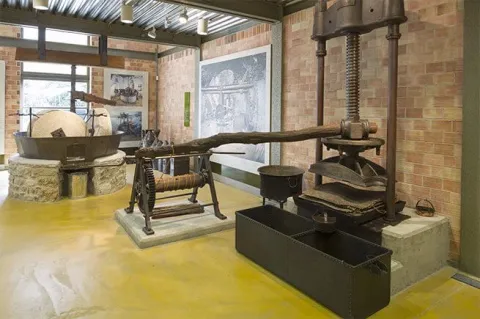

On the southern side of Peloponnese, there is the modern town of Sparti in Greece, constructed next to the location of Ancient Sparta. There is an interesting story regarding the modern foundation of this town. After ancient Sparta declined in the Roman times, another urban center was gradually formatted in the close location of Mystras and this center largely developed in the Byzantine times. However, after the liberation of Greece from the Ottomans, king Otto of Greece ordered in the 1830s the foundation of new Sparta to honor the ancient glory of the place.
This new town was the first town in Greece to be constructed on an architectural plan. This town is found on the way to popular places, like Monemvasia, Elafonissos and Gythio.
Sparti is a small town on the southeastern side of Peloponnese, in mainland Greece. Famous for its legendary history, Sparta was a military centered society, closed by mountainous boundaries from the rest of Greece. The remains of the ancient town can be seen in close distance from the city center. In the Byzantine times, the town of Sparti was neglected by the castle town of Mystras.
However, after Independence, King Otto of Greece ordered the reconstruction of Sparti and this is among the few Greek towns built according to an architectural plan. Sparti is on the way to popular places of Laconia, including Monemvasia, Gythio and Elafonissos. This is why holidays in Sparti can be combined with visits to many beautiful Greek destinations and various things to do.
Sparti is a lovely town famous all over the world for its ancient history. Today, Sparti is a small but modern town. Although tourism is not much developed there, it attracts many visitors due to its history and its closeness to beautiful destinations of Peloponnese. The most interesting sites in Sparti are the two museums, both found in the city center: the Archaeological Museum that hosts excavations from the ancient town of Sparta, and the Museum of Olive Oil that narrates the tradition of olive oil pressing, as Sparti is a region rich in quality oil production.
In close distance from Sparti is the Byzantine Castle of Mystras, one of the strongest towns of the Byzantine Empire in the Medieval era.
City Sights
Sparti Archaeological Museum

The Archaeological Museum of Sparti Peloponnese: The Archaeological Museum of Sparti was built in 1874 by architect G. Katsaros. Later in 1930, two more rooms were added to the main building. The museum is renowned for the archaeological exhibits excavated within and around the town of ancient Sparta, one of the most famous city-states of the Greek antiquity.
The museum owns a number of valuable archaeological collections ranging from the prehistoric era to the Roman era. Some of the prehistoric samples came from all over Laconia and Arcadia. The important categories exhibited include prehistoric collections, Roman sculptures, mosaics and columns from ancient temples.
A very important collection showcases part of the Temple of goddess Artemis. The temple dates back to 10th century BC. The remains of the temple reveal the rich spiritual values that Greece preserved in the ancient age. The artifacts found in the temple are made of different types of materials, including ivory, clay, and stone. Within the museum, there are also parts of the Temple of Apollon in Amycles.
Moreover, the museum hosts a collection of 7th-century clay amphorae that are characterized by relief decorations. The stele is another important exhibit showcased at the museum. It is the Laconian type exhibit, which dates back to 6th century BC. It has figures of couples on both sides. On one side is Menelaos with Helen, and on the other side, Agamemnon and Clytemnestra. On the narrow ridge that separates the two faces, there are snakes.
The museum reveals that a wealthy Spartan culture existed in the ancient Greek. The mosaic samples found in the museum, especially the one that depicts the head of Achilles speaks out this fact. Many Greek mythological characters can be seen depicted on the mosaics, such as god Helius, sea god Triton and the Abduction of Europa by Zeus. The museum is located at Osiou Nikonos Street, 71.
Sparti Olive Oil Museum

The Museum of Olive and Greek Olive Oil is located at the center of Sparti and aims to highlight the importance of olive in the Greek and the Mediterranean culture. This is a history course for the olive trees and olive oil from the prehistoric times till today, with special emphasis on the economic importance of this product for every era.
This museum, founded by the Cultural Foundation of Piraeus Bank Group, is strategically found at the center of Laconia, one of the best olive-producing regions in Greece. In the upper floors, visitors can see the first testimonies of olive existence in Greece, its contribution to the economy of the societies from the prehistoric times till the 20th century as well as its role in nutrition, health, body care, and lighting. There is also a special mention to the symbolic dimension of olive in religion, customs, and art.
The ground floor is devoted to the development of olive oil production from the antiquity till the early industrial times. Visitors can see post-Byzantine machinery for oil production and an animal-powered olive oil press from the early 20th century. Also, emphasis is given on the revival of powered olive oil presses (water-powered, steam-powered, diesel-powered and power-driven). A special section is also dedicated to the use of olive oil in domestic and industrial soap-making.
At the museum's open yard, there is a permanent exhibition presenting a prehistoric, a Hellenistic and a Byzantine olive oil press. This museum is part of the group Mediterranean Museums of Olive.
USEFUL INFORMATION
- USEFUL TELEPHONES
-
EMERGENCY CALL 112
FIRST AID 166
POLICE 100
FIRE DEPARTMENT 199
SPARTI HOSPITAL +30 2731028671
SPARTI BUS STATION +30 2731026441
TAXI SPARTI +30 27310 24100 - SPARTA HOTELS
-
MENELAION HOTEL +30 27310 22161-5
MANIATIS HOTEL +30 27310 22665
DIOSKOURI HOTEL +30 2731 028484
LAKONIA HOTEL +30 27310 28952
